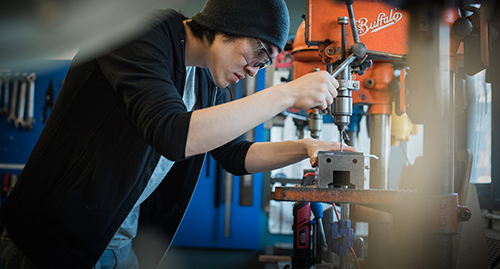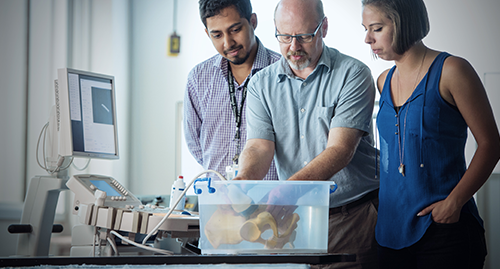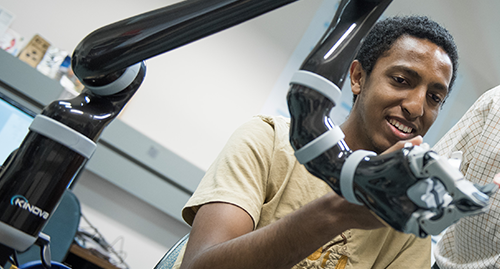Program Options
Our six pathways let students take specialized electives in a particular field of study which will appear on their final transcript, or choose ultimate flexibility and take electives from all areas. Find out more about each of our options below.
Flex
Aerospace
Biomechanics & Medical Devices
Energy & Environment
Mechatronics
Naval Architecture & Marine Engineering
Curriculum Differences
Please see our Options Brochure to view the curriculum of the individual programs. For a comprehensive list of courses and schedules, see the UBC Calendar program listing. Information on each course can be found at mech.ubc.ca/our-department/courses.
Options Information Session
Our annual Options Information Session happens in late January or early February. Details about the selection process that 1st year engineering students and current Mech 2 students should follow, including what supplementary material students may want to include and the submission deadlines will be discussed. Each faculty Option Coordinator will also speak in depth about their particular Option, and will be available to answer any questions.
Session Details
The 2024W Options Info Session took place on January 31, 2025. If you missed the session, you can view the 2024W Options Presentation Slides to learn more.
Option Selection Process
All Mechanical Engineering students must select an Option for their 3rd & 4th year studies, choosing a course pathway that aligns with their interests and abilities. Option selections will also provide the Faculty Option Coordinators and academic advisors the ability to provide guidance and feedback to students as needed.
When to submit your selection
There are two opportunities for students to select a Mech Option. In both cases, submissions open February 1st:
- Early Selection in 1st Year: First-year engineering students may submit a selection to secure a spot* in a Mechanical Engineering Option before making their final decision about which program they apply to for 2nd year placement. Submissions close the last day of February.
- Regular Selection in 2nd Year: Mech 2 students should select an Option they wish to pursue in their 3rd & 4th year studies. Submissions close March 31st.
For both intakes, submit the online MECH Option Selection Form (link below) and include any desired supporting material. In cases where Option seats are limited, these submissions will assist the Option Coordinators in determining which students are most suitable. In these cases, additional interviews may be required before final placement.
*Note: Placement in a Mech Option is conditional on a student being accepted into the mechanical engineering program and completion of Mech 2. 1st year students who are unsuccessful in securing a seat in their Option of choice via Early Selection but who are accepted into the program may re-submit a form during Regular Selection in 2nd year.
Submission Form & Placement Details
Mech Option Selection Form
Submit your Option selection and any supporting documents through the online portal relevant to you:
- Early Selection Form (1st-year students): https://ubc.ca1.qualtrics.com/jfe/form/SV_88tmgF82WUxOj4O
- Regular Selection Form (Mech 2 students): https://ubc.ca1.qualtrics.com/jfe/form/SV_6JPjyi19uU5bdhI
Optional Supporting Documents
Some Options have limited seats available, and it may not be possible to grant entry to all students who select a competitive Option. When submitting your form, you may also wish to include the supporting documents below (especially if selecting Mechatronics). The Option Coordinator will review all selection forms and any supplementary material to determine which students are most suitable to the Option.
Supporting Documents you can include:
- A statement of 250 words or less explaining why you would like to join the Option, any related experience or background you may have, and why it is a good fit for your academic and career aspirations.
- A copy of your current resume.
- An unofficial copy of your grades from Workday.
- Up to 2 pages of supplemental material to support your application, and illustrate your relevant experiences, skills, and interests as they are related to the Option you are applying for:
- May include reference letters, media articles, photos of personal projects/designs, or similar.
- Often takes the form of photos, schematics, screenshots, or other illustrations accompanied by brief descriptions.
- Should be things you have already done – don’t create something just for this.
- Use your discretion to determine which of your experiences are relevant.
- Pages must be 8.5 x 11” with static content (no links, videos, media, objects), in a single PDF file. Any material exceeding 2 pages will be truncated.
2025W Option Coordinators:
- Aerospace: Dr. Kendal Bushe
- Biomechanics & Medical Devices: Dr. Lyndia Wu
- Energy & Environment: Dr. Patrick Kirchen
- Flex: Dr. Boris Stoeber
- Mechatronics: Dr. Yusuf Altintas
- Naval Architecture & Marine Engineering: Dr. Mohammed Hannan
***Please note that Option selections and supporting documents are only accepted via the online form above. Do not email or submit physical applications or supplementary materials. ***
If you have questions about the process above, please e-mail students@mech.ubc.ca.
Interviews
Should the number of students selecting a particular option exceed the number of seats available in it, the Option Coordinator will review the selection forms submitted to determine which students are most suitable for the option. They may also wish to schedule an interview with you to assist with this process. This will be communicated to you via email so it is important that you provide a reliable email address that you check frequently.
Final Placement
Final confirmations of option placements will be made by late March (Early selection) or by early May (Regular selection). You will be notified via email.






